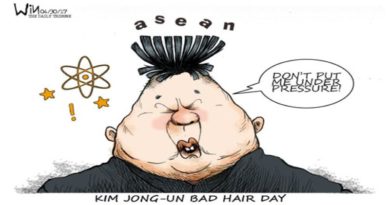Op-Ed Columnist: Asean summits’ silence on the summary killings BY FRANCISCO TATAD
SO many people were clearly disappointed that US President Donald Trump and other world leaders failed to raise the human rights issue with President Rodrigo Duterte during the two-day Association of Southeast Asian Nations (Asean) and East Asia summits. They avoided any mention of the drug killings in the Philippines after DU30 had warned them in a pre-summit statement to “lay off,” even though he himself brought up the issue in his opening speech on Monday when he said, “the menace of illegal drugs continues to endanger the very fabric of our society,” and was poised to say more about it in a concluding statement whose draft had been leaked to the press.
The reaction at home is strong, but infinitely stronger is the reaction in the US, where the liberal American press has started blasting Trump for failing to stand up to America’s tradition of speaking up for democratic values and human rights. On MSNBC, David Rothkopf, a Carnegie Endowment visiting scholar, described Trump’s Asian trip as a great trip for Chinese President Xi Jinping, for North Korean President Kim Jong-un, for the Pacific Rim countries left in the Trans Pacific Partnership after the US pulled out, and for everybody else—except the US. “America First,” which is Trump’s battle cry, has turned out to be America left out in the cold, said the MSNBC anchor.
The offer to mediate
Trump’s reported offer to mediate in the South China Sea dispute between China and its Asean neighbors (notably the Philippines and Vietnam) during his talks with Vietnamese President Tran Dai Quang in Hanoi may have played an important part in his decision to omit human rights. This came right after Trump had tried to persuade President Xi in Beijing to ask Kim Jong-un to call off his threat to attack the US with his rogue missiles and nuclear weapons.
Xi has not telegraphed his actual response to Trump, which leaves us asking whether he, in fact, is going to do anything, and Trump himself has no track record as a mediator. But by offering to mediate in the troublesome sea conflict, the US President might have thought he would be strengthening his ties to both Xi and DU30, who had earlier threatened to separate militarily and economically from the US and align himself with China and Russia “against the world.” He might have thought he could improve his chances of neutralizing the threat from Kim’s rogue missiles.
It appears, however, that technical discussions by the Asean inter-government committee on human rights had been going on prior to the summits, consistent with the Asean Declaration on Human Rights, adopted in November 2012. According to highly informed sources, the group had a whole-day meeting at the Sagada coffeehouse in Quezon City on the eve of the summits. In the course of the discussions some members had reportedly raised questions about press reports quoting DU30 as having told a Filipino audience in Vietnam that at age 16, he had already killed a man.
A lingering grievance
Presidential spokesman Harry Roque was quoted as saying the DU30 quote was no more than the former mayor’s “colorful language.” I wonder how many will take it. The summits’ failure to take up the drug killings obviously created a grievance among some Asean bureaucrats who had expected the summits to formally and publicly address it. But pro-DU30 groups are inclined to regard this as an unqualified DU30 success.
Certain circles had expected the International Criminal Court at the Hague to commence action on a communication filed last April by Mindanao lawyer Jude Sabio against DU30, as amended by Magdalo party-list Rep. Gary Alejano, on the basis of an earlier report appearing in a purported French website. This report has proved to be false.
An official statement from the ICC chief prosecutor Fatou Bensouda has said she had been authorized by the judges in the ICC Pre-Trial Chamber III, as of October 25, to commence an inquiry into the situation of the Republic of Burundi. But there was no mention of the communication against DU30. Burundi has withdrawn from the Rome Statute which created the ICC, but such withdrawal has no effect on the court’s jurisdiction over crimes committed during the time it was still a state party. Some of DU30’s legal advisers who threaten to pull out of the ICC may want to know this.
Misspelling “Philippines”
Unable to contain herself over DU30’s apparent victory, one DU30 supporter said Trump had no choice but to support DU30’s war on drugs because the two presidents have “so much in common.” “Just listen to them talk, and observe the chemistry between them,” she said. I almost fell off my chair when I heard DU30 preface his short toast at the gala dinner with an ad lib remark about his need to preserve his strength so he could eat. He must have thought it cute; I just wasn’t prepared for it.
Moreover, how could Trump ever think of condemning DU30 for his war on drugs, his lady supporter added, when he could not even correctly spell “Philippines”? She was referring to Trump’s tweet upon arrival in the country, in which Philippines was mistakenly spelled “Phillipines.” This has since gone viral, like all of Trump’s other misspellings.
I found this a cheap attempt to reduce a very important issue into a triviality. In Marcos’ time, when I was information minister, one famous US news magazine misspelled “Philippines” on its cover, and in large bold letters too. The magazine’s Asian bureau chief who had written the cover story had to apologize profusely for the slip, which was not his fault, but no one ever tried to make a federal case of it. It’s a normal risk in the trade.
Some famous misspellers
In Trump’s case, he was not the first US President or world leader to misspell common words. George Washington as president, and Winston Churchill in his youth had apparently the same problem, and Andrew Jackson, who became a war hero after defeating the British in New Orleans during the war of 1812 and seventh US president from1829 to 1837, was such a bad speller that John Quincy Adams, the sixth US president from1825 to 1829, once described him as “a savage who can scarcely spell his own name.”
To which Jackson reportedly retorted, “It’s a damn poor mind that can think of only one way to spell a word.”
It could happen to lesser mortals. In 1992, US Vice President Dan Quayle went to an elementary school in Trenton, New Jersey to help facilitate a spelling bee. A 12-year-old student was called to the board to demonstrate how to spell “potato.” He did as told and wrote “potato” on the board. But Quayle thought the young man had missed the last letter of the word, and urged the 12-year-old to correct his mistake. This was how Dan Quayle’s “potatoe” entered immortality.
Wikipedia reminds us that a well-known genius like Albert Einstein refused to write in English because of its “treacherous spelling.” At 15, Jane Austen, world-famous author of Pride and Prejudice, among so many other masterpieces, had begun to write novels, but had problems spelling “Love and Freindship.” Agatha Christie misspelled the names of her own characters; Hemingway constantly misspelled his present participles; F. Scott Fitzgerald filled The Great Gatsby with hundreds of misspelled words; W. B. Yeats, who won the Nobel Prize for Literature in 1929, wrote “feal” to mean “feel.”
From the world of spelling to that of grammar. Many great men have not always been grammatical; not even The New York Times editorial writers are. For instance, in the NYTimes International Edition of Friday, October 27, 2017, the editorial entitled “Pressuring Myanmar’s military” begins with the following sentence: “The plight of the Rohingya people in Myanmar is one of those wrenching tragedies that beggars understanding.” Tragedies is a plural noun that requires a plural verb (beggar); alternatively, “The plight of the Rohingya people in Myanmar is a wrenching tragedy that beggars understanding.”
More serious than spelling
What I am trying to point out is that if anyone is to criticize Trump, it should be for failing to talk to an important ally about the need to observe universal human rights standards in his drug war, not for misspelling “Philippines” on twitter. Two US congressmen—Rep. Hultgren (R, Illinois) and James McGovern (D, Mass), co-chairmen of the Tom Lantos Human Rights Commission—had urged Trump to take up the summary drug killings with DU30 and had earned the Filipino president’s displeasure for it.
This paper has reported that DU30 would like them barred from entering the Philippines, even though American citizens need no visa to enter the country. This, I thought, was an unnecessary aggravation. What the US congressmen wanted Trump to do was for the latter alone to respond to, and he did respond to it by not talking to DU30 at all—if the reports are to be believed—about the drug killings. Even if Trump had acted on their recommendation, there would have been no need for DU30 to react to the congressmen; his business would have been with Trump alone.
As this is written, the draft of a proposed statement from the Asean chair reaffirmed the bloc’s commitment to a “drug-free” region, and welcomed the assistance of the dialogue partners and other external parties in addressing the drug problem through capacity-building, intelligence information sharing, and other forms of cooperation consistent with international law, while “preserving the sovereign right of countries in deciding the most appropriate approaches to address their national drug situations.”
A self-destructive conclusion
After methodically avoiding any discussion of the summary killings in DU30’s drug war, the proposed statement, if issued as drafted, would put the two-day Asean and related summits fully behind DU30’s argument that his government has “the sovereign right,” if not in fact the “sovereign duty,” to terminate mere drug suspects without due process or even documentation, and that everything that happens in the murderous drug war is his government’s domestic and internal business beyond the concern of any outsider. This effectively extinguishes our common view of man as man, and takes Asean and its dialogue partners back to zero.
Courtesy: Manila Times | ON
.
ASEAN NEWSPAPER OPINIONS AND EDITORIALS
7.1. Xi fills vacuum- The Daily Tribune
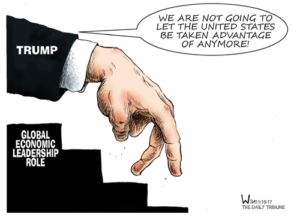
7.2. NO OP-ED EDITORIAL -COLUMNIST – The Manila Bulletin
.
7.3. Lipstick on a pig- The Manila Standard
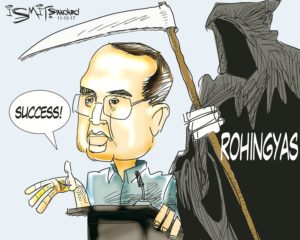
7.4. MS. MARIA ISABEL LOPEZ SUMMONED BY LTO- The Manila Times
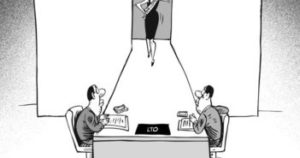
7.5. Trump and Duterte– The Philippine Daily Inquirer.
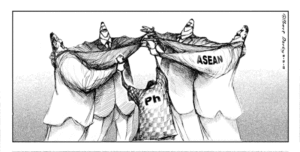
7.6. Finally, full implementation? – The Philippine Star
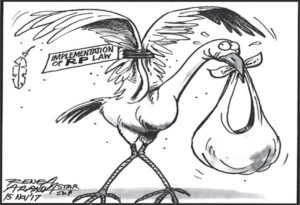
<>
NOTE : All photographs, news, editorials, opinions, information, data, others have been taken from the Internet ..aseanews.net | [email protected] |
For comments, Email to :
D’Equalizer | [email protected] | Contributor









